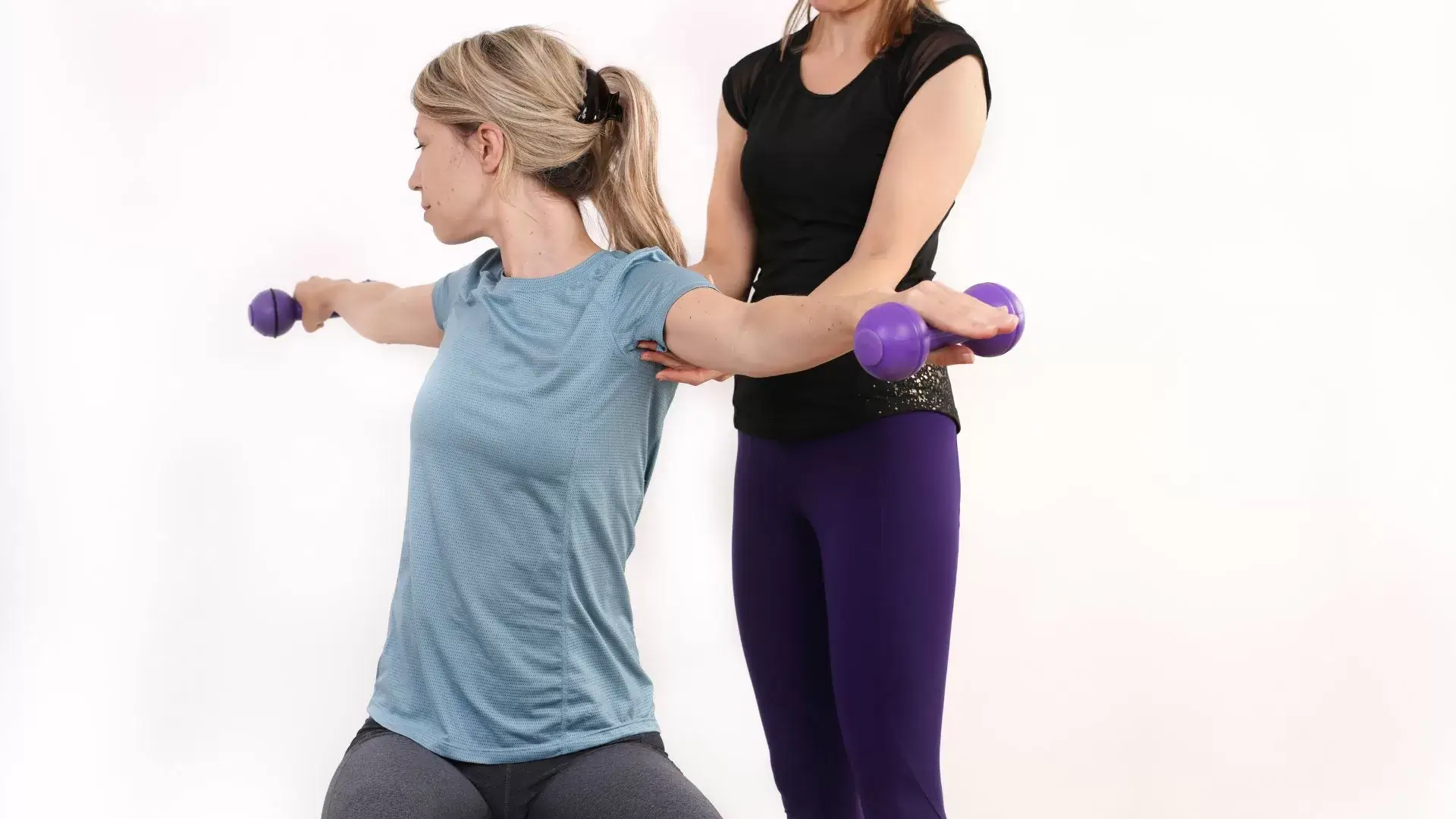If you’re seeking a chiropractor for frozen shoulder in Mississauga, we have you taken care of. Our evidence-based approach focuses on alleviating pain and restoring mobility. We employ manual therapy techniques and personalized exercises to tackle your specific needs. By addressing the underlying causes of your discomfort, we aim to enhance your shoulder function effectively. With our patient-centered care, we guarantee you feel supported throughout your recovery. Together, we’ll work on tailored rehabilitation to facilitate healing. Curious about the methods we use and how they can benefit you? Stay tuned to explore more about our all-encompassing services.

At Mississauga Physio Chiro Clinic, we combine evidence-based physiotherapy and chiropractic services to effectively address frozen shoulder and enhance our patients’ overall mobility and well-being. We recognize that frozen shoulder, or adhesive capsulitis, can lead to significant shoulder stiffness and pain, making daily activities challenging. Our approach focuses on restoring shoulder mobility loss through a thorough rehabilitation therapy program tailored to each individual’s needs.
Our Best Physiotherapy and Chiropractic Services in Mississauga work synergistically to provide holistic shoulder treatment. We employ targeted exercises aimed at improving range of motion, alongside manual therapy techniques designed to alleviate shoulder pain and reduce stiffness. This non-surgical treatment approach not only addresses the symptoms but also targets the underlying causes, ensuring a complete recovery process.
Throughout treatment, we emphasize patient-centered care, actively involving you in your rehabilitation journey. By educating you about your condition and progress, we foster a supportive environment where you can regain confidence in your shoulder’s functionality. We’re committed to helping you regain full mobility and an improved quality of life, free from the limitations imposed by frozen shoulder. Together, we’ll work towards achieving your health goals.
Frozen shoulder, also known as adhesive capsulitis, occurs when the connective tissue surrounding the shoulder joint becomes inflamed and stiff, leading to significant pain and limited mobility. We often see this condition progress through frozen shoulder stages, where shoulder immobility and restricted shoulder movement become more pronounced. Patients typically experience chronic shoulder pain and joint stiffness, greatly affecting their daily activities.
The primary causes of frozen shoulder are shoulder inflammation and previous shoulder joint dysfunction, which can result from injuries or prolonged immobility. Certain risk factors also contribute to this condition, such as age, gender, and underlying health issues like diabetes.
To effectively manage frozen shoulder, we focus on postural correction and injury prevention strategies. Early diagnosis and a tailored approach to shoulder rehabilitation are essential for restoring function and minimizing discomfort. By understanding the complexities of this condition, we can better support our patients in their journey toward recovery. Together, we can work to alleviate pain and improve shoulder mobility, ensuring a more active, pain-free lifestyle.
Chiropractic care offers effective strategies for alleviating the pain and stiffness associated with frozen shoulder, focusing on restoring mobility and enhancing overall function. We utilize a variety of chiropractic solutions tailored to address the unique challenges of frozen shoulder, including shoulder capsule thickening and limited shoulder range of motion.
Manual therapy techniques, such as joint mobilization, help to improve the movement of the shoulder joint capsule, reducing tension and discomfort. We also incorporate stretching exercises designed to gently increase flexibility and restore range of motion, allowing for a gradual return to daily activities.
In addition to these hands-on therapies, we often recommend heat therapy to promote blood flow and relax tight muscles, as well as cold therapy to reduce inflammation and pain. Shoulder physiotherapy may also be integrated into our treatment plans, providing a thorough approach to recovery.
Understanding the three stages of frozen shoulder—freezing, frozen, and thawing—can greatly aid in managing symptoms and tailoring treatment approaches effectively. In the freezing stage, we often experience increasing shoulder pain and stiffness, which can make daily activities challenging. This stage typically lasts six weeks to nine months and requires a focus on pain management and gentle physical therapy to maintain as much mobility as possible.
Once we shift to the frozen stage, the shoulder pain may decrease, but stiffness can considerably impair our range of motion. During this time, engaging in specific shoulder exercises is essential, as they help to preserve function and prevent further deterioration. Utilizing mobility aids and making ergonomic adjustments can also support our daily activities without exacerbating symptoms.

Incorporating chiropractic adjustments can greatly enhance our ability to restore shoulder joint function and alleviate discomfort during the recovery process from frozen shoulder. These adjustments target the underlying issues, such as shoulder capsule tightening and shoulder adhesions, which contribute to shoulder fibrosis and limit both passive and active range of motion.
Chiropractic adjustments help to realign the shoulder joint, allowing for improved biomechanics and reducing the risk of shoulder impingement. By addressing the rotator cuff’s function, we can promote better stability and mobility in the shoulder. Evidence suggests that regular adjustments can considerably reduce pain and enhance overall shoulder function.
Additionally, integrating techniques such as myofascial release can further support our efforts in breaking down scar tissue and alleviating tension within the affected muscles. This combination of chiropractic adjustments and supportive therapies creates a holistic approach, ensuring we’re not just treating symptoms but addressing the root causes of frozen shoulder.
Ultimately, our goal is to empower patients with effective, evidence-based interventions that facilitate healing and restore ideal shoulder joint function, enabling a return to daily activities without pain or restriction.
Manual therapy and myofascial release play essential roles in enhancing shoulder mobility for patients dealing with frozen shoulder, as they effectively target restrictions in the soft tissues and improve overall range of motion. By applying techniques such as deep tissue massage and trigger point therapy, we can alleviate joint pain and address muscle imbalances contributing to shoulder instability and weakness.
In our approach, we focus on individualized treatment plans that incorporate manual therapy techniques to release tight muscles and fascia around the shoulder joint. This not only reduces pain but also prepares the body for further rehabilitation. Once we’ve improved soft tissue flexibility, we integrate resistance training and neuromuscular re-education exercises to strengthen the shoulder and guarantee proper movement patterns.
Our goal is to empower patients by enhancing their shoulder mobility and functional capabilities. With consistent sessions, we can help manage symptoms effectively, allowing patients to regain the confidence needed for daily activities. Ultimately, combining manual therapy and myofascial release sets a strong foundation for a thorough recovery plan tailored to each patient’s unique needs.
To effectively reduce shoulder stiffness in patients with frozen shoulder, we employ targeted joint mobilization techniques that enhance movement and alleviate discomfort. These techniques are specifically designed to address shoulder pain and improve mobility by increasing the range of motion in the affected joint.
In our practice, we consider the interrelated conditions of rotator cuff tendinitis and shoulder bursitis, which often contribute to shoulder muscle tightness and overall stiffness. By utilizing joint mobilization techniques, we can gently manipulate the shoulder joint, breaking down adhesions and promoting better alignment.
Additionally, we incorporate proprioception training to help patients regain their sense of joint position and balance, which is essential for recovery. Complementing our mobilization strategies, we may also recommend cryotherapy and ultrasound therapy to reduce inflammation and enhance healing.
To support our patients further, we collaborate with occupational therapy specialists to develop personalized rehabilitation plans. Our goal is to empower patients in their recovery, ultimately leading to improved shoulder function and a reduction in pain. By focusing on evidence-based approaches, we endeavor to facilitate long-term healing and restore quality of life.
Strength training and resistance exercises play an essential role in shoulder rehabilitation, helping us restore strength and stability in the affected joint for ideal recovery. By addressing shoulder muscle imbalance, we can effectively target weak areas and improve overall function. Incorporating isometric exercises allows us to engage muscles without joint movement, which is beneficial during the initial stages of rehabilitation.
As we progress, eccentric and concentric exercises can help build strength and stability, enabling us to regain full range of motion. Hydrotherapy can complement these exercises, providing a low-impact environment that eases strain on the shoulder while promoting healing. Additionally, electrical stimulation therapy can enhance muscle activation and recovery.
To manage pain and inflammation, we may consider anti-inflammatory medication, alongside supportive measures like shoulder bracing and kinesiology taping. These techniques can provide stability during our exercises, making it easier to perform movements safely.
Improving shoulder health often starts with postural correction and ergonomic support, as these factors play an important role in preventing further injury and enhancing overall function. Poor posture can contribute to shoulder pain and is a common issue for individuals experiencing conditions like shoulder arthritis or frozen shoulder. By focusing on postural correction, we can alleviate the stress placed on our shoulders, improving shoulder mobility and reducing the likelihood of acute shoulder pain.
Implementing ergonomic support in our daily activities is equally vital. This includes adjusting our workspace to promote proper alignment and using tools that minimize strain on our shoulders. Regular chiropractic care can also help us identify and address postural imbalances, further supporting our rehabilitation journey.
In conjunction with these strategies, we should incorporate rehabilitation exercises specifically designed to strengthen the shoulder and improve mobility. By actively engaging in these exercises, we can enhance our shoulder health, making it easier to perform daily tasks without discomfort. Ultimately, prioritizing postural correction and ergonomic support is key to our recovery and long-term shoulder health.

In addition to postural correction and ergonomic support, managing pain and inflammation through heat and cold therapy can greatly enhance our comfort and recovery when dealing with frozen shoulder. Utilizing heat therapy can help relax muscles and improve blood circulation, which is beneficial for alleviating symptoms of shoulder synovitis. On the other hand, cold therapy can reduce inflammation and numb pain, serving as an effective approach to pain management.
In our treatment journey, we might consider combining these therapies with other modalities like acupuncture and dry needling, which can further assist in relieving discomfort. For more severe cases, we may discuss options such as NSAIDs or corticosteroid injections during an orthopedic consultation. These minimally invasive procedures can provide significant relief and help us regain function.
Ultimately, it’s important to tailor our approach to pain management based on individual needs and responses to these therapies. By integrating heat and cold therapy with other treatments, we can create a thorough plan that supports our healing process and enhances our overall well-being.
Chiropractic care offers a holistic approach to relieving shoulder bursitis, tendinitis, and impingement by addressing underlying musculoskeletal issues and enhancing joint function. At our clinic located at 1834 Lakeshore Rd W #6C, Mississauga, ON L5J 1J7, we focus on individualized treatment plans that integrate techniques like TENS therapy to alleviate pain and promote healing.
By employing targeted adjustments, we can improve shoulder mobility and reduce inflammation, which often leads to a decrease in the necessity for invasive options like shoulder surgery or arthroscopic surgery. Our goal is to empower our patients, helping them regain control over their shoulder function without resorting to more drastic measures like shoulder decompression.
We understand that every patient’s experience is unique, and we’re committed to listening to your concerns and tailoring our care accordingly. With our evidence-based methods and patient-centered focus, we aim to provide relief, restore function, and enhance quality of life. If you’re struggling with shoulder issues, don’t hesitate to contact us. Let’s work together towards your recovery and improved well-being.
Acupuncture and dry needling can be effective treatments for frozen shoulder, helping to alleviate pain and restore mobility through targeted stimulation of trigger points and meridian pathways. We’ve seen how these techniques work well in conjunction with other therapies, offering patients a holistic approach to recovery.
In acupuncture, fine needles are inserted at specific points to promote healing and improve circulation. Research shows that this method can considerably reduce pain and improve function for those suffering from frozen shoulder. It’s not just about the needle; it’s about addressing the underlying issues that cause discomfort.
Dry needling, on the other hand, focuses on relieving muscle tension by targeting trigger points. This technique can be particularly effective for patients with tight muscles around the shoulder, enhancing flexibility and reducing pain. By releasing these knots, we can facilitate better movement and function.
Both treatments encourage the body’s natural healing processes, making them a valuable option for individuals seeking pain relief and improved mobility. We believe that integrating acupuncture and dry needling into a thorough treatment plan can empower our patients to regain their quality of life and return to their daily activities with confidence.
Following the pain relief and mobility benefits of acupuncture and dry needling, kinesiology taping and bracing offer additional support by stabilizing the shoulder joint and enhancing functional movement. We’ve found that these techniques can be particularly beneficial for those dealing with frozen shoulder, as they provide external support while allowing for a full range of motion.
Kinesiology tape is designed to lift the skin slightly, which can help improve circulation and reduce swelling. When applied correctly, it allows us to maintain our daily activities without further aggravating our shoulder. This method not only aids in stabilizing the shoulder but also promotes proprioception, helping us become more aware of our shoulder positioning during movement.
Bracing, on the other hand, provides more rigid support, preventing excessive movement that could lead to further pain or injury. It can be especially useful during exercise or physical activity, giving us the confidence to engage in rehabilitation exercises safely.
Ultimately, incorporating kinesiology taping and bracing into our treatment plan can enhance our overall recovery experience, allowing us to regain our shoulder function more effectively while managing discomfort.
Rehabilitation therapy plays an essential role in restoring long-term shoulder function and mobility after experiencing frozen shoulder, helping us regain strength and flexibility through targeted exercises and personalized care. By engaging in a structured rehabilitation program, we can effectively address the limitations imposed by this condition.
Research shows that a combination of stretching, strengthening, and range-of-motion exercises can greatly improve our shoulder’s functionality. Our rehabilitation journey typically starts with gentle stretches to gradually increase mobility, followed by specific strengthening exercises that focus on the rotator cuff and shoulder blade muscles. This tailored approach guarantees we’re not only alleviating pain but also preventing future issues.
Additionally, incorporating modalities such as ultrasound or electrical stimulation can enhance our recovery process by promoting blood flow and reducing inflammation. Regular assessments with our rehabilitation therapist allow us to monitor progress and make necessary adjustments to our exercise regimen, guaranteeing we’re on the right track.
Ultimately, commitment to rehabilitation therapy not only aids in regaining our shoulder’s functionality but also empowers us to return to daily activities with confidence and ease, fostering a sense of independence and well-being.
When dealing with frozen shoulder, we can explore a variety of non-surgical and surgical treatment options tailored to our specific needs and circumstances. Initially, we often start with non-surgical methods, such as physical therapy, which focuses on gentle stretching and strengthening exercises. These approaches aim to restore mobility and reduce pain over time. We might also consider corticosteroid injections, which can provide temporary relief by reducing inflammation in the shoulder joint.
In cases where non-surgical treatments don’t yield adequate improvement, we may need to discuss surgical options. One common procedure is arthroscopic capsular release, where a surgeon removes the thickened capsule surrounding the shoulder joint. This can greatly enhance our range of motion. Another option could be manipulation under anesthesia, where we’re placed under sedation while the doctor gently moves the shoulder to break up adhesions.
Ultimately, our choice of treatment should be guided by our specific symptoms, overall health, and lifestyle. By collaborating with healthcare professionals, we can guarantee that we choose the most effective and appropriate treatment path for our frozen shoulder, thereby enhancing our recovery journey and improving our quality of life.
Getting expert chiropractic care in Mississauga can be a game-changer for those of us dealing with lasting shoulder pain, as it offers targeted treatment strategies aimed at alleviating discomfort and restoring mobility. Chiropractors utilize a combination of hands-on adjustments, soft tissue therapy, and exercise recommendations tailored to our specific needs.
Research shows that chiropractic care can considerably improve range of motion and reduce pain levels in individuals suffering from conditions like frozen shoulder. By addressing misalignments in the spine and shoulder girdle, we can enhance our body’s natural healing processes. This holistic approach not only focuses on the shoulder itself but considers how other areas of our body contribute to the pain.
During our initial consultation, our chiropractor will conduct a thorough assessment to identify the root causes of our discomfort. From there, they will create a personalized treatment plan aimed at promoting recovery and preventing future issues. Regular follow-ups allow for ongoing evaluation and adjustments to our care as we progress.
For those of us seeking lasting shoulder pain relief, partnering with a skilled chiropractor in Mississauga can lead to meaningful improvements in our daily lives, helping us regain the activities we love.
Located in the heart of the Greater Toronto Area, Mississauga is a vibrant city known for its diverse community, rich cultural scene, and numerous recreational opportunities that enhance our quality of life. We’re proud to call this city home, as it offers residents access to various parks, trails, and community centers that promote an active lifestyle.
Mississauga’s population is a blend of cultures, making it a melting pot of traditions and experiences. This diversity enriches our community and fosters an environment of inclusivity and understanding. With its thriving economy, we benefit from ample job opportunities and a robust healthcare system that provides access to various specialists, including chiropractors who focus on conditions like frozen shoulder.
As we explore our city, we can appreciate the numerous health and wellness resources available to us. Local chiropractors are dedicated to helping residents manage pain and improve overall well-being. Their patient-centered approach guarantees that we receive personalized care tailored to our unique needs. By embracing the resources Mississauga offers, we can work towards a healthier, pain-free life together.

When we consider treatment for frozen shoulder, we typically find that recovery can take anywhere from a few months to over a year. Treatment duration often depends on individual factors like the severity of our condition and our commitment to rehabilitation exercises. We should remember that consistency and patience are key, as we work through physical therapy and other interventions to regain our range of motion and reduce pain effectively.
When it comes to insurance coverage for chiropractic treatment, we should check our individual policy details. Many plans do cover chiropractic services, but specifics can vary widely. It’s important to contact our insurance provider directly to confirm what’s included. We can also ask our chiropractor’s office for assistance; they often have experience handling insurance claims. Ultimately, understanding our coverage options will help us make informed decisions regarding our treatment.
Frozen shoulder can definitely impact our daily activities and work. We might struggle with simple tasks like reaching for items or performing overhead movements, leading to frustration and reduced productivity. This condition can also affect our sleep and overall quality of life. It’s essential for us to seek appropriate treatment to manage pain and regain mobility, allowing us to return to our normal routines and responsibilities more comfortably and effectively.
When considering exercises during recovery from frozen shoulder, we should avoid any movements that cause pain or discomfort. High-impact activities, heavy lifting, and overhead motions can exacerbate our condition. Instead, we can focus on gentle stretching and strengthening exercises, ensuring we listen to our bodies. Consulting with a healthcare professional can help us tailor an appropriate exercise regimen that promotes healing while avoiding strain, helping us regain our shoulder’s functionality safely.
To prevent frozen shoulder from recurring, we should focus on maintaining our shoulder mobility through regular, gentle stretching and strengthening exercises. It’s essential to stay active and avoid prolonged periods of inactivity. We can also benefit from proper posture and ergonomic adjustments in our daily activities. In addition, staying mindful of any pain or stiffness and addressing it early can help us keep our shoulders healthy and functional in the long term.
Reach out to us today to book an appointment or learn more about our services. Our friendly team is here to answer your questions and help you take the first step toward improved health and wellness.
(647) 372-1209

At our Mississauga Physio Chiro Clinic, we are dedicated to providing personalized care that addresses the root cause of your discomfort. With a team of experienced physiotherapists and chiropractors, we focus on restoring your mobility, relieving pain, and enhancing your overall well-being.